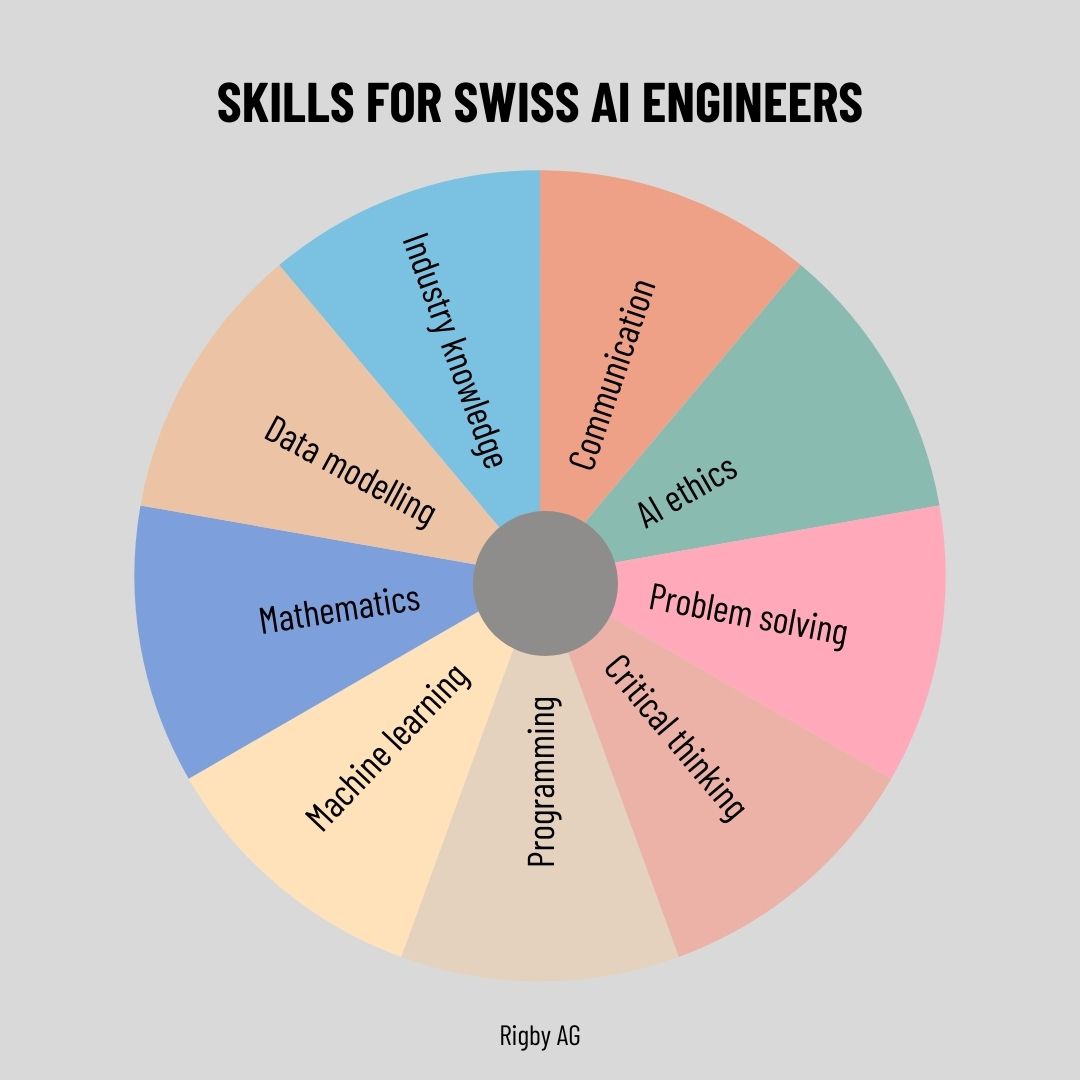AI Jobs in Zurich: What 8 Essential Skills Are Swiss Employers Looking For?
In Switzerland, most large companies see artificial intelligence as a way of driving future growth. It is estimated that AI could add billions to Swiss businesses’ profits in the next decade, so the number of AI jobs in Zurich is set to rise. Companies need highly skilled workers with the necessary hard and soft skills to succeed in this challenging field. So, what exactly are businesses looking for, and how can you gain the necessary skills?

1. Adaptability and Problem-Solving
Artificial intelligence is one of the most rapidly changing fields in the world. For this reason, being able to identify and analyse problems and find suitable solutions is essential. Aside from the technical issues you may encounter, you’ll also have to deal with the ethical, social, and business aspects of AI.
Problem-solving often requires several steps. They may include:
- Defining the problem: Find out what you want to achieve and what the metrics are.
- Exploring the problem: Use relevant sources, data, and existing solutions. Identify gaps and new opportunities.
- Finding solutions: Consider all possibilities. Test them out to determine whether they are viable.
- Communicating solutions: Inform all stakeholders, explain your choices, and get feedback.
2. Communication
As an AI engineer or machine learning specialist, you’ll most likely be working as part of a team. You’ll also have to communicate your technical ideas and solutions to stakeholders. This requires excellent communication skills.
In Switzerland, there may be the added challenge of a language barrier. AI jobs in Zurich often require excellent English and German skills. If you frequently work with people in Western Switzerland, French may also be advantageous. You’re more likely to land a Swiss AI job if you can speak at least two languages fluently.
3. Critical Thinking
Critical thinkers can objectively analyse and evaluate issues. By trying various approaches, identifying any biases, and seeking evidence for their assumptions, they can select the right models and determine whether a solution is fair and ethical. As AI becomes more prevalent across the world and is affecting an increasing number of people, this skill is in high demand. Good critical thinkers are invaluable as companies compete to find effective AI solutions.
4. AI Ethics
A closely related skill is the understanding and management of AI ethics. As artificial intelligence develops, there are increasing concerns. Some issues that often come up are:
- Privacy and data protection
- Compliance
- Job displacement
- The misuse of AI
- Discrimination
- Copyright and intellectual property
- Autonomy
People who are able to find creative solutions to these problems are increasingly in demand. They can work in a wide range of industries and businesses.
5. Programming
Programming languages are the building blocks of AI development. They allow you to create algorithms, implement AI models, and manipulate data. One of the most frequently used programming languages is Python, so this is a great place to start if you don’t yet have any experience. It is extremely versatile and easier to understand than some other languages because the syntax is simple, and it uses elements of English.
However, you’ll need to know additional languages if you want to stand out. Some AI-related ones might be Java, SQL, C++, and R.
6. Machine Learning
Machine learning experts create programs that learn and adapt without further human input. In other words, they develop artificial intelligence models. It is estimated that this market will grow substantially in the future, both in Switzerland and globally.
To become proficient, you’ll need to learn:
- Data modelling and analysis
- Machine learning algorithms and models
- Deep learning
- Computer vision
Data Modelling and Analytics
Artificial intelligence algorithms are trained on vast amounts of data. You’ll need to have a good grasp of data modelling to effectively create and manage AI models and interpret the information you collect. Having experience in data visualisation platforms is a distinct advantage when applying for AI jobs in Zurich.

7. Mathematics
You can’t effectively solve AI-related problems without a good understanding of mathematics, particularly statistics. You’ll need to apply probability theory, calculus, and algebra. Depending on your role, you may also need to use mathematical concepts to categorise information and make predictions.
8. Industry-Specific Knowledge
Companies in a wide range of industries are looking for AI engineers and machine learning specialists. If you already have professional experience, highlight this on your CV. You may be able to find a specialist AI job. Some examples of industry-specific applications of AI include:
- Healthcare: analysing data, identifying patterns and increasing the accuracy of diagnoses, providing 24/7 support, developing personalised medicine
- Finance: detecting fraud, optimising investment strategies, personalising customer interactions
- Agriculture: harvesting in bulk, managing crops, analysing soil quality, analysing weather patterns
- Education: developing intelligent and personalised tutoring programmes, automating grading, enhancing curricula
- Manufacturing: controlling and improving quality, automating processes, detecting equipment failures early, developing new products
Other relevant industries might include retail, travel, real estate, entertainment, automotive, fashion, and hospitality.
How to Acquire the Necessary Skills for AI Jobs in Zurich
Although there is an IT shortage in Switzerland, employers are often looking for something specific. Most Swiss companies prefer to wait rather than hire someone under-qualified or unsuitable. Therefore, acquiring the necessary skills is important. There’s not a single best way to upskill, but here are some tips.
- Fill any hard skill gaps: Start by checking out job listings for positions you’re interested in. Read through the requirements and figure out whether you’re missing any technical skills or qualifications. If so, take courses online, in your home country, or in Switzerland. You can also reach out to potential Swiss employers and ask them for course recommendations.
- Improve your soft skills: If you don’t feel confident with one of the AI-relevant soft skills, consider taking an online course and asking for feedback in your current position. Practice communicating with a wide range of people, and learn from role models or coaches. Highlight anything unique that you bring to the table, such as familiarity with other cultures or languages.
- Learn a language: Learning German or French is a great way to increase the number of AI jobs in Zurich that are open to you. Although positions that only require English exist, candidates with proficiency in several languages are usually preferred.
- Get acquainted with the culture: Before you apply for jobs and arrive for your first interview, make sure you understand Swiss work culture. Some things, like the way to structure a CV and the interview process, may be different. Read as much as you can about working in Switzerland.
The number of AI jobs in Zurich and other Swiss cities is likely to increase in the next few years. Acquiring the necessary skills now could help you get your dream job. Another way to increase your chances of finding an AI engineer or machine learning position is to make contact with a Swiss recruitment company. Fill out the Rigby AG application form now, and we’ll notify you as soon as suitable new jobs come up.